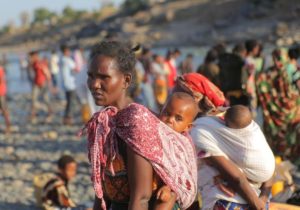Peace deal struck in Ethiopia
A peace deal signed in Ethiopia this month has brought hope for an end to the world’s deadliest conflict.
After two years of war and hundreds of thousands of deaths, a ceasefire arrangement was struck on November 2 between Ethiopia’s federal government and their rivals in the northern Tigray region.
Brokered in South Africa by the African Union and supported by international partners, the deal represents an effective victory for the government, whose forces have been pushing towards the Tigray capital, Mekelle.
Under the agreement, Tigrayan rebels must disarm within 30 days and the federal government will take control of the region, ruling through an interim administration.
Humanitarian access and the resumption of essential services has also been agreed – ending a blockade imposed by the Addis Ababa-based federal government.
Questions still remain though over Eritrea – whose forces were vital to Ethiopia’s final military push.
The agreement does not stipulate the withdrawal of Eritrean troops. Nor does it seem to broach the fate of western Tigray – a region occupied by the pro-federal government forces of neighbouring Amhara.
 Nevertheless, the deal is being hailed as a dramatic breakthrough after two years of war that killed thousands, displaced millions and threatened to tear apart Africa’s second most-populous country.
Nevertheless, the deal is being hailed as a dramatic breakthrough after two years of war that killed thousands, displaced millions and threatened to tear apart Africa’s second most-populous country.
Under the agreement, both sides agree to end all forms of hostilities, including acts of violence, sabotage, air strikes, and “hostile propaganda, rhetoric, and hate speech”.
They also agree they will not collude with any external force hostile to either party and federal authority will be restored in Tigray, including control of federal institutions.
Under the deal, the government will ensure that Tigray is represented in federal institutions, including parliament, and both parties recognise that Ethiopia has only one defence force.
The Tigray People’s Liberation Front (TPLF), the party that dominates Tigray, has agreed to fully disarm, including light weapons, within 30 days.
And, TPLF fighters will enter a disarmament, demobilisation and reintegration (DDR) program. Ethiopia’s military will return to the Tigray regional capital, Mekelle.
The conflict flared in 2020 when Prime Minister Abiy Ahmed ordered a military intervention last week against the region’s powerful ruling party, the Tigray People’s Liberation Front (TPLF), after reports of attacks on government military bases.
Tensions between the TPLF and the federal government have been escalating for months, when Addis Ababa indefinitely postponed regional and national elections because of the COVID-19 pandemic. TPLF officials opposed the decision and organised their own elections.
An ethnic Tigrayan party, the TPLF was the dominant force in Ethiopian politics until Abiy took office in 2018. Its members have since lost positions within the central government, and several officials were arrested for corruption and human rights abuses.
Up to two million people were displaced by the conflict, which also impacted humanitarian support for people fleeing neighbouring Eritrea. As many as 600,000 people are reported to have died as a result of the conflict; and earlier this year the UN issued a warning about imminent famine with 350,000 people at risk of food shortages.












